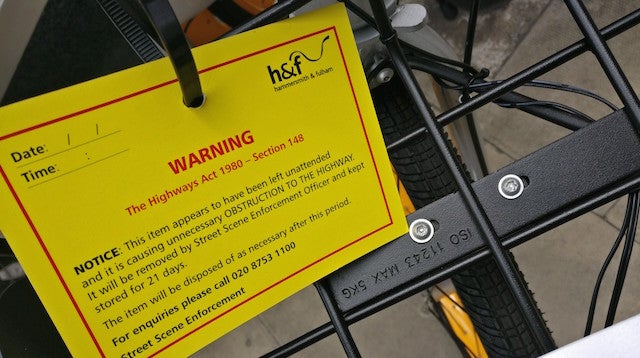oBike UK Launch: What you need to know about the controversial ‘Boris Bike’ rival

oBike, a dockless cycle hire scheme that lets you unlock your ride with your smartphone, has landed in London – but the launch has been far from plain sailing for the new ‘Boris Bike’ rival so far. Our guide to oBike in the UK reveals all you need to know.
Some 400 oBike cycles started rolling out to London’s streets on Tuesday July 11, but it seems they have already fallen foul of the authorities in the Borough of Hammersmith and Fulham, where government-backed Street Scene Enforcement killjoys have started doling out highway obstruction notices.
TrustedReviews very own Computing Editor Michael Passingham broke the news via his Twitter account, having taken a luncheon-related amble up the Fulham Palace Road.
https://twitter.com/statuses/885827277300412416
The problem, it seems, stems from the fact that oBike doesn’t appear to have consulted the local council before adorning London’s pavements with their bikes.
https://twitter.com/statuses/885829089390710784
Other locals aren’t exactly happy about the sudden appearance of oBikes on their pavements.
https://twitter.com/statuses/885773485326438400
Hammersmith and Fulham (H&F), for its part, has been worryingly polite about the situation – or are we just suckers for a smiley emoji in 2017?
https://twitter.com/statuses/885801618175864832
H&F have now issued a full statement, in which it says that oBike have agreed to remove the offending bicycles pending discussions on how to make the new scheme work in the borough.
Part of the update reads:
“After we raised our concerns, oBike agreed today (Friday) to remove the bikes they have deposited in the borough.
“The company has also agreed to meet with the council to discuss ways to make their cycle scheme work without negatively affecting pedestrians.”
We’ve contacted oBike for comment and will update this article should we receive a response. Any additional information that comes to light will also be added in due course.
oBike in London: What is it and how does it work?
oBike is a sharing economy startup that began life in Singapore.
It is in the process of expanding internationally and currently operates in Singapore, Taiwan, Malaysia, Thailand, Australia, Switzerland and the Netherlands, as well as London.
At its core, it’s a cycle hire/bike sharing venture similar to the TfL-backed ‘Boris Bike’ scheme (which are officially known as Santander Cycles, not that anyone ever calls them that).
Where oBikes differ is that they’re not docked, which is an appealing prospect for casual cyclists and commuters, as undocking a Boris Bike can be a bit like wrestling your big uncle Ern for the last slice of Christmas pudding.
Instead, users download the oBike app, locate a bike, and scan a QR code to release it. Pricing is set at a competitive 50p per 30 minutes, with a deposit of £49 required, though there’s a promotional offer in London for July where rides are free and the deposit cut to £29.
When you’re down with your ride, you’re responsible for manually re-locking your oBike. This seems to be part of the problem, as there’s nothing stopping less considerate cyclists from leaving their bike strewn the pavement (see image above).
Similar problems have been reported in other areas where oBike operates, particularly Australia.
Still, it’s a novel idea that addresses a genuine bugbear from many people looking for a more convenient way to nab a pair of wheels when they’re out and about.
In all, it’s understood oBike plans to unleash 6,000 of its bikes across London.
Related: Ebikes vs road bikes
What do you think of oBike? Let us know in the comments below.

